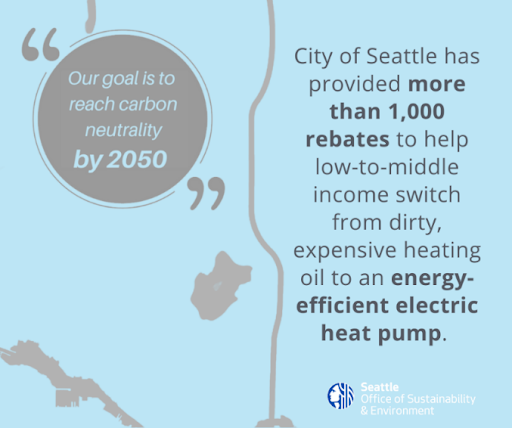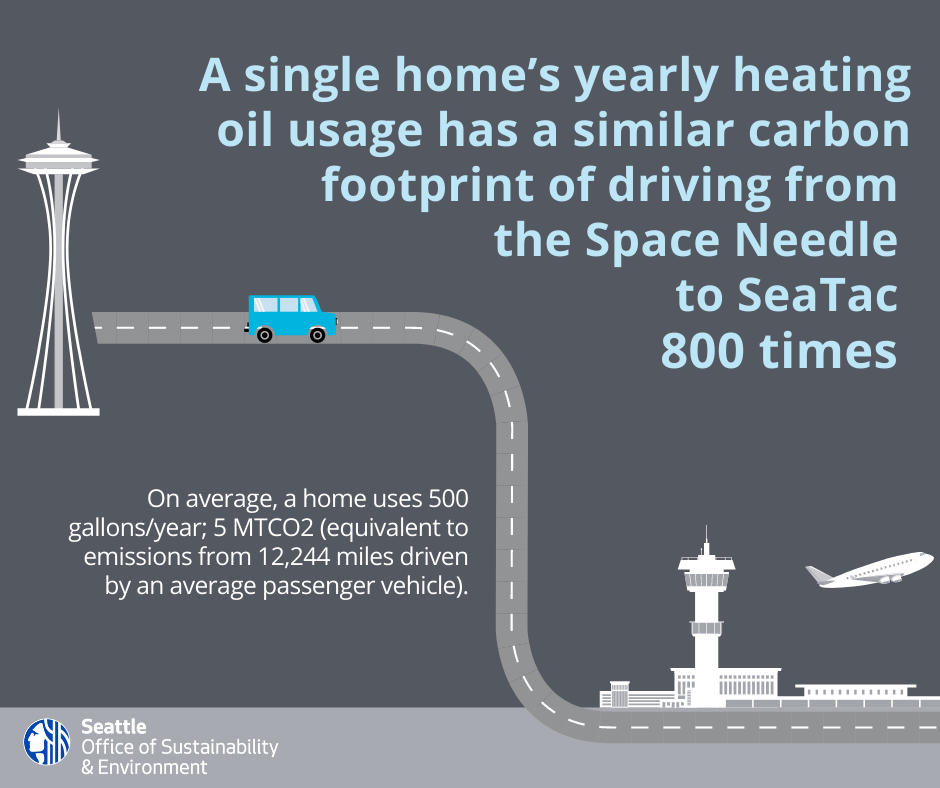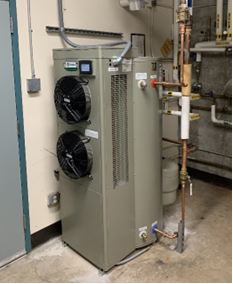

The City of Seattle has hit another milestone in its commitment to environmental and climate justice and a greener city – reaching 1,000 rebates offered to transition homes from oil-to-electric heat! Targeting climate pollution in buildings is one of the City’s priorities, and the Clean Heat program rebates incentivize and support building owners to make this transition. We sat down with OSE’s Climate and Energy Advisor Christine Bunch, who manages the Clean Heat program, to learn more about the program and why the transition from oil-to-electric heat is so important.
What is the Clean Heat Program?
The Clean Heat Program helps the city move toward the goal of reducing climate pollution by incentivizing households heating with oil to transition to energy-efficient electric heat pumps. The program provides an instant $1,500 rebate that our participating contractors apply to the customer invoice. Households that are income-qualified can receive a no-cost heat pump conversion through the Office of Housing.
When we launched the program in 2017, we estimated there were around 18,000 households with oil heat. Since then, we’ve seen between 1,300-1,500 households per year transition off oil, which means the total number of homes with oil is now between 10,000 and 13,000. Recently, Seattle City Council approved $2.6 million in funding in the 2023 and 2024 budget for oil conversion incentives, while repealing the oil tax ordinance.
You can also check out our website, Seattle’s Clean Heat Program, for more info on the program.
Why is the City trying to convert from oil heat?
Oil heat is extremely carbon-intensive. It’s much dirtier than natural gas and electricity, and a heat pump is three times as efficient in heating than an oil furnace. Oil is stored in underground tanks that often rust, erode, and eventually leak and can contaminate the soil and groundwater. The clean up for a an oil leak can be costly and disruptive. Oil is also expensive. Global events such as the invasion in Ukraine caused the price of oil to spike and the future price of oil only looks to be trending upward. So not only does oil negatively contribute to climate impacts, but it’s also more expensive for homeowners.

Why else is it important for homeowners to think about transitioning off of oil heat?
We want homeowners to think about using the cleanest form of energy for not just themselves but for their community as well. It is important for homeowners to consider how old their oil tank is and the environmental and economic risks that come with using oil heat. Hopefully, this, along with the incentives offered by the City, will motivate those with oil to convert to a heat pump as soon as possible.
What are some benefits of a Heat Pump?

Electric heat pumps have more benefits than just reducing carbon pollution. An energy-efficient electric heat pump is three times more efficient than an oil furnace. It can help you reduce heating and cooling costs and improve the health, safety, and comfort of your home while also helping the environment. Heat pump technology has also vastly improved over the last five to ten years. Heat pumps have the technology to detect changes in temperature and adjust accordingly, and as the technology of heat pumps has advanced, so has their reliability.
Another benefit of a heat pump is that it provides air conditioning. As we have seen over the past summers here in Seattle, hitting temperatures of over 85 degrees is the new norm, and a heat pump provides cooling and comfort in these summer months, where the temperatures continue to rise. Heat pumps also have filtration, and some offer the option to increase the heat pump’s filtration system to protect from climate impact hazards such as the wildfire smoke and poor air quality we continue to experience during the summers.
What are the next steps for being on track to transition off all oil heating by 2028?
Our goal is to accelerate the adoption of clean heating technology and ensure people have access to clean heat and that it’s affordable. The rebate is something that accelerates and influences that decision to convert. It is an instant rebate, where you can choose your own contractor from our list of participating installers, and whoever you decide to use will give you $1,500 off on the invoice. On January 1, 2023, there will be a $2,000 tax credit that kicks in, but we still need to see what additional rebates may become available as a result of the federal government’s Inflation Reduction Act. We expect to get more information on that in the coming months and will update our web site with more information..
Is there a right time to think about converting?
Anytime, or as soon as possible. We are in the middle of winter, but soon there will be a lot of demand for air conditioning as well. We suggest you start researching now, as contractors will become increasingly busy as the year progresses. The program website, nomoreoilheat.com has a list of participating contractors you can contact for more information and no-cost estimates. The instant rebate is for everyone, but for households with lower incomes, folks can contact the Office of housing for a no-cost heat pump conversion. You can download an application from the Office of Housing homewise page. Also, once a home is electric, it is eligible for additional assistance and additional weatherization improvements.
Is there any advice you’d like to offer those still with oil?
Be prepared, and be proactive before it’s too late. If you wait, you could end up with an even more expensive repair and/or a tank leak while also contributing to our City’s pollution.